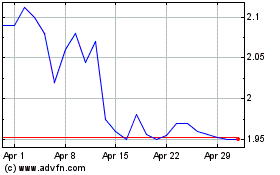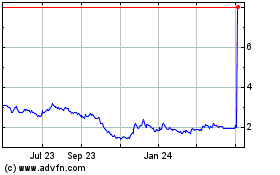AEterna Zentaris: Article on Phase 2 Trial with Cetrorelix in BPH to be Published in European Urology Journal
May 13 2008 - 7:30AM
PR Newswire (US)
QUEBEC CITY, May 13 /PRNewswire-FirstCall/ -- AEterna Zentaris Inc.
(NASDAQ:AEZSNASDAQ:TSX:NASDAQ:AEZ), a global biopharmaceutical
company focused on endocrine therapy and oncology, today announced
that the article titled "Placebo-controlled dose-ranging Phase 2
study of subcutaneously administered LHRH antagonist cetrorelix in
patients with symptomatic benign prostatic hyperplasia (BPH", has
been accepted for publication in an upcoming issue of the European
Urology Journal. Written by F.M.J. Debruyne, Department of Urology,
Academic Hospital Nijmegen, The Netherlands, A.A. Gres, Clinical
Urology MOKB, Minsk, Belarus, and D.L. Arustamov, Center of
Urology, Ministry of Health of Republic of Uzbekistan, the article
refers to results of a Phase 2 trial with cetrorelix in BPH, which
showed a prolonged improvement in BPH symptoms and uroflow,
persisting up to the end of the 20-week observation period. These
results are part of previously disclosed Phase 2 data on cetrorelix
in BPH through prior abstracts and poster presentations. The
article is available online at http://www.europeanurology.com/
Prof. Jurgen Engel, Ph.D., Executive Vice President, Scientific
Affairs at AEterna Zentaris commented, "We are very proud to have
the work of Prof. Debruyne and his colleagues on cetrorelix
published in this prestigious peer reviewed European journal. The
article, along with the recent Best Poster Presentation Award that
Prof. Debruyne received last March at the 23rd Annual European
Association of Urology Meeting, is another acknowledgement of the
quality of our development program with cetrorelix in BPH." THE
ABSTRACT Background and Objectives Pilot studies with daily dosing
suggested the use of the luteinizing hormone-releasing hormone
antagonist cetrorelix for the treatment of symptoms from BPH. The
objective was to assess efficacy and safety of three dosing schemes
of cetrorelix in patients with symptomatic BPH. Trial Design After
a run-in period with four weekly injections of placebo, 140
patients with an international prostate symptoms score (I-PSS)
>= 13 and a peak urinary flow rate (PFR) 5-13 ml/s were randomly
allocated to four treatment groups. Patients received either
cetrorelix at dosages of 5 mg/wk x 4, 10 mg/wk x 2 or 10 mg/wk x 4
or placebo. Main and secondary endpoints included I-PSS, PFR and
mean uroflow, residual urinary volume, prostate volume, plasma
testosterone, quality of life, and sexual function which were
evaluated over a total of 20 weeks after randomization. Results In
all cetrorelix groups, a rapid improvement in mean I-PSS was
obtained, with a peak effect of -5.4 to -5.9 (placebo: -2.8). After
all dosages of cetrorelix given, changes from baseline and
differences to placebo were statistically significant up to week
20. Similarly, secondary parameters showed a significant, rapid,
and persistent improvement for all cetrorelix dosages. All dosage
regimens were well tolerated. The study evaluated a single
treatment course only; further studies with repeated treatment
courses will be required to establish a dose regimen for long-term
disease management. Conclusions In summary, the trial showed a
rapid onset in improvement of I-PSS, urinary symptoms and quality
of life, accompanied by a slight reduction in prostate size with a
short course therapy with cetrorelix. The improvement lasted well
beyond the dosing period. This should, therefore, allow for the
development of intermittent dosage regimens of cetrorelix with two
or three treatment courses per year, thus relieving concerns about
treatment compliance with drugs requiring daily dosing. About
Cetrorelix Cetrorelix is part of AEterna Zentaris' LHRH antagonist
therapeutic approach that has demonstrated in Phase 2 studies to
provide fast and long-lasting relief of BPH symptoms while being
well tolerated, with a low incidence of sexual side effects.
Cetrorelix peptide-based drugs were developed by the Company in
cooperation with Nobel Prize winner Prof. Andrew Schally, currently
of the U.S. Veterans Administration in Miami. Cetrorelix acetate is
marketed under the brand name Cetrotide(R), the first LHRH
antagonist approved for therapeutic use as part of in vitro
fertilization programs (controlled ovarian stimulation/assisted
reproductive technologies) in Europe, the U.S. and Japan. It was
launched on the market through Serono (now Merck Serono) in the
United States, Europe and in several other countries, as well as in
Japan through Shionogi. About the Cetrorelix Phase 3 Program in BPH
Cetrorelix pamoate is being studied in three Phase 3 trials which
will include approximately 1,500 men with symptomatic BPH in the
United States, Canada and Europe. One Phase 3 efficacy trial,
primarily in the United States and Canada and with additional sites
in Europe, involves approximately 600 patients (which are fully
enrolled) and is being led by Herbert Lepor, M.D., Professor and
Martin Spatz Chairman of Urology, New York University School of
Medicine, New York. In the trial, patients enter a no-treatment
run-in observation period to confirm severity and stability of
voiding symptoms based on the International Prostate Symptom Score
(I-PSS). Patients are then randomly allocated to cetrorelix or
placebo in a double-blind fashion. Patients are administered
cetrorelix by intra-muscular (IM) injection at Week 0, 2, 26 and 28
and are followed up to Week 52. Then, in an open-label extension,
patients will receive cetrorelix by IM injection at Week 52, 54, 78
and 80 will be followed up to Week 90. A second, similarly designed
ongoing multi-center Phase 3 efficacy study, being led by Prof.
Frans M.J. Debruyne, M.D., Ph.D., from The Netherlands, will enroll
approximately 400 patients in Europe. The third Phase 3 trial
currently screening patients, is an open-label, single-armed
multi-center safety study involving approximately 500 patients in
both North America and Europe, and is being led by Joel Kaufman,
M.D., Associate Clinical Professor of Urology, University of
Colorado School of Medicine, Denver, Colorado, and Urology Research
Options, Aurora, Colorado. The primary endpoint for both North
American and European efficacy studies is the change in I-PSS
between baseline and Week 52. Other efficacy endpoints include
additional measures of BPH-symptom progression and the need for
BPH-related surgery. Safety endpoints include changes in sexual
function. Other important endpoints include plasma changes in
levels of testosterone, and assessment of other adverse events. The
cetrorelix Phase 3 program is based on comprehensive clinical
practice guidelines to ensure quality control, including input from
expert advisors on study design, publishing results in
peer-reviewed journals and discussion of the studies with
regulatory agencies. Benign Prostatic Hyperplasia Benign prostatic
hyperplasia (BPH) is one of the most common diseases of aging men -
affecting more than 20 million men in the United States - but its
etiology is far from being completely understood. Data from ongoing
research suggest BPH and its associated lower urinary tract
symptoms (LUTS) are more complex conditions than once thought.
While previous research on BPH etiology tended to focus on
testosterone and other hormones, more recent research suggests
other factors may play a greater role in the development of BPH and
LUTS - including inflammation, various growth factors, and
adrenoreceptors. BPH-associated LUTS include frequent urination
and/or urgent need to urinate, waking at night to urinate
(nocturia), difficulty starting urination and/or weak urinary
stream, and feeling that the bladder is not completely empty after
urination. While current therapies provide some efficacy in BPH
they are often associated with troublesome sexual side effects.
About AEterna Zentaris Inc. AEterna Zentaris Inc. is a global
biopharmaceutical company focused on endocrine therapy and
oncology, with proven expertise in drug discovery, development and
commercialization. News releases and additional information are
available at http://www.aezsinc.com/. Forward-Looking Statements
This press release contains forward-looking statements made
pursuant to the safe harbor provisions of the U.S. Securities
Litigation Reform Act of 1995. Forward-looking statements involve
known and unknown risks and uncertainties, which could cause the
Company's actual results to differ materially from those in the
forward-looking statements. Such risks and uncertainties include,
among others, the availability of funds and resources to pursue
R&D projects, the successful and timely completion of clinical
studies, the ability of the Company to take advantage of business
opportunities in the pharmaceutical industry, uncertainties related
to the regulatory process and general changes in economic
conditions. Investors should consult the Company's quarterly and
annual filings with the Canadian and U.S. securities commissions
for additional information on risks and uncertainties relating to
the forward-looking statements. Investors are cautioned not to rely
on these forward-looking statements. The Company does not undertake
to update these forward-looking statements. We disclaim any
obligation to update any such factors or to publicly announce the
result of any revisions to any of the forward-looking statements
contained herein to reflect future results, events or developments
except if we are requested by a governmental authority or
applicable law. DATASOURCE: AETERNA ZENTARIS INC. CONTACT: Dennis
Turpin, CA, Senior Vice President and Chief Financial Officer,
(908) 626-5503, ; Media Relations: Paul Burroughs, Director of
Communications, (418) 652-8525 ext. 406,
Copyright
Aeterna Zentaris (NASDAQ:AEZS)
Historical Stock Chart
From Jun 2024 to Jul 2024

Aeterna Zentaris (NASDAQ:AEZS)
Historical Stock Chart
From Jul 2023 to Jul 2024
